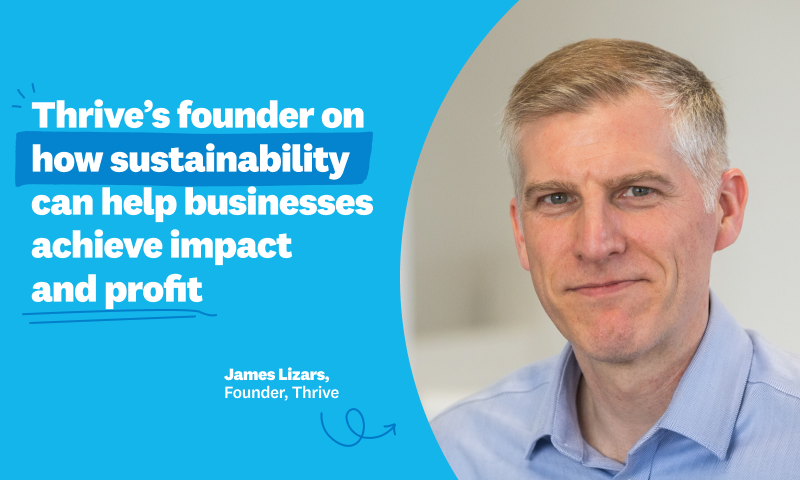
Small business owners and entrepreneurs can feel like they face immense pressure to not only drive profits, but take positive action for our planet as a whole.
While these aren’t mutually exclusive, owners with a huge amount on their plates face a real challenge in understanding how they can achieve both.
B-Corp certified accounting practice Thrive is on a mission to help tech start-up clients achieve this balance, ensuring they’re successful across people, planet and profit.
We spoke with James Lizars, founder of Thrive, to learn more.
Building foundations
Having climbed the ladder as an accountant in the advertising industry, James developed a passion for employee engagement and how it could be a driver for commercial success.
“I found that success was all about talent. If you’ve got the best people, you do the best work and make the most as a business,” James explains.
He then founded Thrive in 2013, with Xero a part of the practice’s journey from the start:
“It dawned on me that I could start my own business, instead of working for a huge global marketing group. I’d been using Xero for a few years already, and was aware of how firms in Australia and New Zealand were progressing the way accountants worked with small businesses, using this new technology to put real-time financial information into the hands of owners and entrepreneurs.”
With his experience and the functionality of Xero, James felt there was a gap that he could fill for small businesses to boost the way they operate. As the practice gathered momentum, he built a portfolio of technology start-up clients. Almost ten years later, Thrive is thriving.
Start me up
The world of tech start-ups is unique, and uniquely challenging.
James says, “The main difficulty my clients face is a lack of certainty. It’s a dynamic environment that is constantly changing. Will you get an investment round or not, how big will it be? From one year to the next, what the founder is working on can be so different.”
He tells us that tech start-ups need accountants that can work at this level of volatility: “We are very much on the front foot, making sure clients get what they need when they need it, as quickly as we can.”
Planet positive
James discusses Thrive’s focus on helping clients achieve more than just a healthy bottom line:
“In 2018 I learned about the UN’s global goals, and then B1G1, the platform that enables micro-giving to projects that support one or more of these global goals. This was a lightbulb moment – if employee engagement has been a driver of growth over the past couple of decades, delivering a positive impact on our environment and communities is going to be key in the years ahead.”
He mentions businesses like Toms Shoes – which gives away one pair of shoes for every pair sold – as an example.
“There’s a movement of people caring more about who they work for and with. This is the business case for positive impact. It can attract and retain customers and job candidates, motivate employees and more.”
James adds, “There’s an opportunity to steal a march on the competition by being the best in your space at making a positive impact.”
Making an impact
Asked about Thrive’s projects, James shares, “Every time a new client signs with us, we provide micro loans to a female entrepreneur in Africa. We share this information in the clients’ onboarding forms, so they know they’re making a positive difference.”
For Thrive, action around the climate crisis underpins everything. The team is part of the Million Tree Pledge – a group of businesses and individuals who pledged to plant 1 million trees.
“Those who can, should support climate projects. The pledge felt really ambitious, but one of the ways we’re working towards this goal is with Xero, using our partner discount to plant trees. This is actually accounting for almost a third of our target.”
Thrive has planted 106,000 trees, and is on track to achieve its goal. But James won’t stop there: “Once we’re further along with our pledge, we’ll move focus onto water and education projects with similarly ambitious targets. It’s important to do what we can.”
Tips for small businesses
Asked for tips for small businesses facing challenging times, James offers:
“Manage profit. Look at your costs regularly and make sure you’re not wasting money. Subscriptions that are running but don’t offer the same value as they once did should be removed, for example.”
He suggests you look at product lines and thoroughly analyse what’s making you money and what’s not. “With Xero, you can easily get access to data to help you find out what isn’t working,” he says.
James then suggests focusing on cash flow. He concludes:
“Look at cash flow design – how can you try to close the gap between doing the work and receiving your money? Look at payment terms, for example. The process is so straightforward – you have a ‘Pay Now’ link on an online invoice – so why are there 30 day terms? This is a standard that needs to change. We should help small businesses have the confidence to tell big customers this is too long.”
The post Thrive’s founder on how sustainability can help businesses achieve impact and profit appeared first on Xero Blog.
Leave a Reply